Your University
Improving access to nutritious foods in India
See how our Research Institutes are changing lives around the world.
Page 13
My Sheffield: Bryony Page Interview with our Olympian alumna. Page 14
There’s nowhere quite like Sheffield
Sharing alumni memories from the 1960s to today. Page 22
MAGAZINE
THE
FOR ALUMNI AND FRIENDS | 2023/24
Countering the cost of living
Expert analysis of the crisis from Professor Richard Murphy Page 18
A note from your editor

The UK is experiencing a costof-living crisis. As a progressive institution, we’re responding wherever we can. Sheffield’s SU Officers have been leading a grassroots campaign for more financial support for struggling students (see page 9), and “radical accountant” Professor Richard Murphy has been thinking about how the solution can come from the top (see page 18).
With money never far from our minds, there couldn’t be a better time to celebrate 20 years of Sheffield Calling (see page 26) and the lives it has changed, from the callers and alumni, to the students who benefit from the donations it’s brought in. We’ve been reflecting on how lucky we are to live here in Sheffield, too – looking back over 50 years of our university city (see page 22). And we’re sharing news on the new online student-alumni portal ‘Sheffield Connect’; one place for you to connect with your fellow alumni, our current students and all the benefits you’re entitled to.
In this issue, we also find cause for hope from our departments: we’re riding a new wave in social sciences (see page 4), developing new potential treatments for Motor Neurone Disease and a Sexual Rights Charter for older people (see page 10), and creating open access for the world to use all of our world-leading research (see page 7).
Thanks for reading.
Sarah Hopkins (BA English Language with Linguistics 2003) Alumni Communications Manager






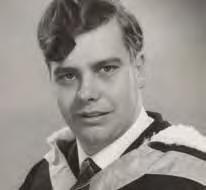

Welcome
26 30 Celebrating Sheffield Calling The lasting legacy of John Turner 20 years of connection and fundraising. How one alumnus’ gift changed the lives of so many students. 3
Contents 18 Countering the cost of living: Solutions to the crisis Analysis of the cost-of-living crisis from Professor Richard Murphy. 21
place for you to connect with your peers. 16 Made together: A year of progress How the collaboration with our partners is making a difference for people and businesses in South Yorkshire. 14 My Sheffield: Bryony Page We catch up with the Olympian and world individual trampoline champion who’s blazing a trail in sport. 04 University news 10 Research in focus 32 In profile 38 Dates for your diary 40 Your notes and news 42 Honorary degrees 42 Alumni honours 43 Alumni volunteer of the Year 2 Regulars Features Your University is available to view online at youruniversitymagazine. sheffield.ac.uk There’s nowhere quite like Sheffield
tell us what makes this the best place to live and study.
Introducing Sheffield Connect One
You
University news
Welcome to The Wave: Sheffield’s new Faculty of Social Sciences building

With its name chosen by staff, students and the local community, ‘The Wave’ expresses the curving glass facades and overlapping upper floors of the world-class facility which will open its doors from the next academic year.
The Wave continues the trend of naming buildings based on their physical form – with The Diamond and The Octagon on campus, and (only slightly more famously) The Gherkin and The Shard in London. Inside will be social and study spaces available to all students and staff, a new public cafe, plus hubs and facilities dedicated to a number of subjects.
World-leading sustainability
The University has been ranked 42nd in the world and 8th in the UK for its work on sustainable development. (2023 Times Higher Education (THE) Impact Rankings.)
Sheffield research powers first net zero transatlantic flight
A sustainable, social development
The Wave is our campus’ most sustainable development to date, in part because it’s the first to operate with ‘net zero’ emissions. Ground-source heat pumps will provide heating in winter and cooling in summer and solar panels will generate electricity.
Outside, the landscaping will grow Sheffield’s famous greenspace, with rain gardens for sustainable drainage and extensive tree planting. Outdoor social spaces will be open for all to use and have been designed to link the building with the University’s other recent public realm works on the Concourse and Leavygreave Road.
A new wave of collaboration
The facility will bring together a wide range of disciplines under the same roof for the first time. From the next academic year, The Wave will be the home to Journalism and Sociological Studies, the Information School, School of Education, Sheffield Methods Institute, Social Research Institutes and the White Rose Doctoral Training Partnership.
With so many talented people coming together in the same place, taking on key societal and global challenges, The Wave looks set to be transformational for the faculty and the University.
First-of-a-kind Ukrainian language course launched
The University of Sheffield is launching the UK’s first ever language conversion course for those studying Slavonic languages who want to learn Ukrainian at a quicker pace.
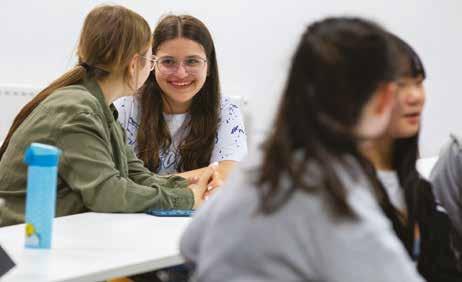
This course will be taught by Ukrainian academics hosted as part of the University of Sanctuary initiative, and there will also be a beginners programme open to anyone for a minimal fee. The idea is to fill the UK skills gap, by creating more specialists in the languages and cultures of Eastern Europe.
As a University of Sanctuary, Sheffield has created Sanctuary Scholarships for those who have sought refuge in the UK from a conflict or forced migration. And we continue to partner with the National Technical University of Ukraine Igor Sikorsky Kyiv Polytechnic Institute –including helping to fund the rebuild of campus air raid shelters.
More on the courses here sheffield.ac.uk/mltc/courses/ ukrainian
The historic flight will take off from London later this year, thanks to a British-led consortium including University of Sheffield’s Sustainable Aviation Fuels Innovation Centre.
The flight is expected to be fuelled by sustainable aviation fuel (SAF) made primarily from waste oils and fats, such as used cooking oil. The use of 100% SAF on the flight, combined with onboard technology that traps and stores carbon from the atmosphere during the journey, will make the flight net zero.
Our Energy Institute will be working with manufacturers, the aviation industry and operational partners to ensure the scientific integrity of the data used in the project – showing the world that UK academia can play a leading role in the advance of net zero aviation.

YOUR UNIVERSITY 2023/24 THE MAGAZINE FOR ALUMNI AND FRIENDS 4 5
Launching the UK’s biggest research platform
Anyone, anywhere can discover and explore our pioneering research, thanks to our new platform.
The University of Sheffield Player gives people access to a curated library of quality, evidence-based content. It’s the perfect showcase for the work of Sheffield’s internationally-recognised researchers, using videos, podcasts and digital exhibitions.
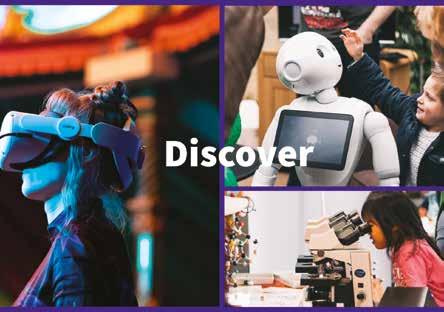
From art to Artificial Intelligence, climate change to cutting-edge medicine, food security to societal issues – the Player makes this research accessible, engaging and freely available to all, in one place for the first time.
You can visit the Player here player.sheffield.ac.uk
We’re in the world’s top 50 most international universities
Rising two places since 2022, we’re now the 46th ‘most international university in the world’ and 15th in the UK, according to Times Higher Education.
The ranking is based on the proportion of international students and staff, collaboration on research across the world, and strong global reputation.
Anyone who’s studied at or visited the University will know we have a massive, diverse community that calls the City home – and we provide outstanding support for international students.
This is the fourth time we’ve featured on the list. It’s the result of a deliberate decision by the University to attract people from around the world which began in earnest in 2013 with the founding of the
#WeAreInternational campaign and now the UK Council for International Student Affairs is driving forward the awardwinning campaign. And this domestic policy is mirrored by the wide range of projects with international partners, and global impact.
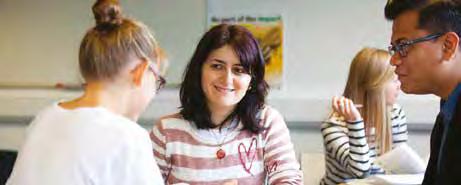

Top 50
most international universities
New policy supporting research collaborations
Showing a commitment to a culture of open learning, the University’s Senate has approved a new policy which enables researchers to promote their findings as soon as their academic papers are published.
The move offers exciting opportunities – both for sharing research with a wider audience and for collaboration and innovation.
For example, Sheffield was one of the first UK research centres to publish fully-sequenced genomes of the Covid-19 virus.
Sharing findings openly with the international data bank GISAID enabled researchers to track the spread and evolution of the virus, and so supported rapid treatment development.
YOUR UNIVERSITY 2023/24 THE MAGAZINE FOR ALUMNI AND FRIENDS 6 7
Campus update
From pocket parks to a brand new Faculty of Social Sciences building (see page 4), creating a world-class campus is a yearround labour of love. Here are some of the projects we’ve been working on this year.
• The planning of a new super lab is well under way. Our new Central Teaching Laboratory will mark a significant change in how science and related subjects are taught, with the vast majority of laboratory teaching in one building, consolidating expertise and promoting collaboration. Just like The Wave, which is our first building that’s net zero in operation, the super-lab will have sustainability embedded in its design and operation.
• Energy efficiency is on our minds and our work agenda. We’re constantly looking at options to reduce our energy consumption. All of our electricity already comes from renewable sources, and the next stage of our decarbonisation plan is to see how we can change our campus fuel source. For example, we’re seeing if we can transition from gas central heating to ground source heat pumps – a process that began in the design stages of The Wave. Along with investing in our infrastructure, we’ll continue monitoring and controlling energy usage.
That will also mean changing University policy, improving insulation and eventually we’d love to be able to generate our own energy.
• The City’s urban green spaces are growing. Our Landscape Management Team has designed and created the Gell Street pocket park, our largest to date. Some of the materials for the park were those left over from other projects, and some of the plants were grown or nurtured in our nursery. The biodiverse planting includes evergreen and deciduous trees, meadow turf to encourage bees and grape vine cuttings that were taken from the former Henderson’s Relish factory site nearby.
What’s new at the SU
• And on that note, you’ll be pleased to know we’ve started work on preserving ‘Henderson’s House’ – the former Henderson’s Relish factory. We’ll be using the existing bricks as much as possible and replacement windows and doors will match the original style. Plans for how the building can be used in future are currently being discussed, and in the meantime the iconic signs of our muchloved landmark have been taken down for safe-keeping.
Get the latest on ‘Henderson’s House’ and other estate projects at sheffield.ac.uk/our-estate


Students lead campaign for cost-of-living support
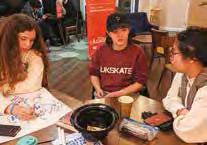
SU Officers have been campaigning across the city, and nationally, to support struggling students.
In a recent survey by the NUS, 90% of students interviewed said the rising cost of living had negatively impacted their mental health. From transport costs to socialising, we’ve seen how students are drastically cutting back.
In response, SU Officers have joined forces with other Unions up and down the country, coordinating a campaign for long-term financial support through maintenance loans. City-wide, SU Officers have also been lobbying local MPs and Councillors to reduce public transport costs for students in Sheffield. And of course, the University itself has set up a hardship scholarship fund of £3m, thanks in part to generous donations from our alumni community.
Marking 50 years of LGBT+ representation
The Students’ Union itself extended its weekend opening hours during the winter months to provide a warm space for students to study and relax, with free charging points and microwaves available. Our Clothes Swap Shop has also become a permanent outlet this year, and –despite also feeling the extra financial pressures – the SU has frozen ticket prices for events wherever possible and introduced a range of food and drinks deals in its outlets.
This LGBT+ History Month, a plaque was unveiled to commemorate 50 years since the first motion was passed in support of gay rights at our SU. Liberation Officer Grace Cleary and LGBT+ Students’ Officer Jamie Shipp were joined by Gerry Firkins, President of Gay Soc 1973-75, to mark the occasion. The plaque can be found in the Interval Bar and Restaurant, which, during the 70s, was the auditorium and the space where the motion was first debated and passed.
Our SU voted best in UK for sixth year running Brand new student forums launched
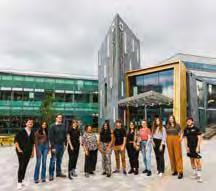
Bagging the Whatuni Student Choice Award 2023 for Best Students’
Union again is an amazing honour, especially because we know 35,000 student reviews from across the UK contributed towards the win.
We were also shortlisted for the University of the Year and Student Life categories.
How did the SU shape your time at Sheffield? Let us know by emailing your memories to sualumnimemories@sheffield. ac.uk or fill out our form.
Brand new Academic and Liberation Forums have been introduced to make it easier for students to submit their ideas and make the change they want to see both on campus and in the world.
YOUR UNIVERSITY 2023/24 THE MAGAZINE FOR ALUMNI AND FRIENDS 8 9
Illustration by School of Architecture student Katie Cottle (Instagram @katiecottle.art)
Research in focus
Discrimination.
Human health. Sustainable transport. The challenges that face humanity don’t observe departmental boundaries. That’s why our four flagship research institutes nurture interdisciplinary problem solving. Here are four examples of how they’re changing the world for the better.
 ENERGY INSTITUTE
ENERGY INSTITUTE
Clearing the way for sustainable aviation fuels
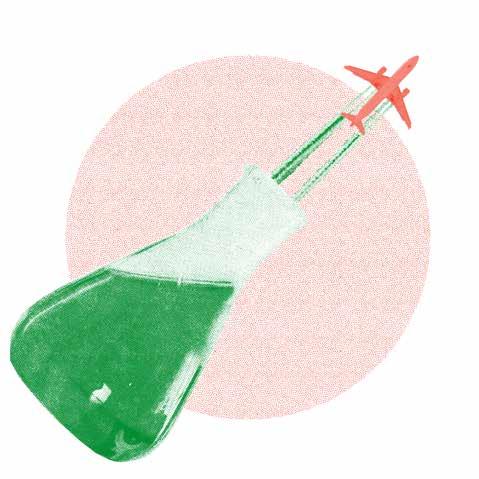
The lengthy development and testing process for new aviation fuels can be a barrier to innovation. Which is why the UK government has chosen the Energy Institute at The University of Sheffield to host the UK’s first sustainable aviation fuel Clearing House.
Opening this summer, the hub will coordinate the certification of new, sustainable aviation fuels and advise fuel producers on testing. The SAF Clearing House is a major step in enabling the UK to bring new fuels to market – reducing carbon emissions from the aviation industry.
NET ZERO FLIGHT
And later this year, the Energy Institute will also support the world’s first net zero transatlantic flight (see page 5). Taking off from the UK as part of a pioneering research project to fly across the pond using sustainable aviation fuel, this is just one more example of how we’re making South Yorkshire the UK’s leading R&D hub for sustainable aviation.
For more information, visit: sheffield.ac.uk/news/first-ukclearing-house-certifying-newsustainable-aviation-fuelslaunch-university-sheffield
NEUROSCIENCE
INSTITUTE
A turning point for motor neurone disease
We believe a new genetically-targeted therapy to treat a type of motor neurone disease (MND) could be a game changer, after results of a Phase 3 clinical trial showed significant improvement in patients’ symptoms of the debilitating disease after 12 months.
MND, also known as amyotrophic lateral sclerosis (ALS) is a disorder that affects the nerves, or motor neurons. The progressive disease affects a patient’s ability to walk, talk, use their arms and hands, eat and breathe. MND is a group of diseases with multiple causes, which is why it is so difficult to treat.
The Phase 3 clinical trial, sponsored by biotechnology company Biogen Inc. investigated patients whose MND was caused by a faulty SOD1 gene, which is responsible for 2% of MND cases.
Professor Dame Pamela Shaw, Director of the Neuroscience Institute at the University of Sheffield, said: “I have conducted more than 25 MND clinical trials and this is the first time patients have ever reported an improvement in their motor function.
“Never before have I heard patients say ‘I am getting better, I am doing things today that I couldn’t do a few months ago – walking in the house without my sticks, walking up the garden steps, writing Christmas cards’. For me this is a real game changer.”
In 2023, the Food and Drug Administration in the US authorised this treatment for patients. The drug, which will be sold as QALSODY™ by Biogen Inc, is a major scientific advance as the first treatment to target a genetic cause of MND.
For more information, visit: sheffield.ac.uk/research/features/ turning-point-motor-neuronedisease
YOUR UNIVERSITY 2023/24 THE MAGAZINE FOR ALUMNI AND FRIENDS 10 11
HEALTHY LIFESPAN INSTITUTE INSTITUTE FOR SUSTAINABLE FOOD
UK’s first Sexual Rights Charter tackling aged-based discrimination
Developed as a collaboration between the University and Age-friendly Sheffield, the UK’s first ever Sexual Rights Charter is part of a wider campaign to end the stigma around the sex lives of older adults, and improve health and wellbeing.
The Sexual Rights Charter, the first of its kind in the UK, aims to help health and social care professionals, service providers and the community to develop inclusive practices and policies, and ensure that people are treated with the dignity and respect they deserve, whatever their age. It can be used in different environments, such as GP surgeries and community spaces to raise public awareness of this sensitive and much-neglected issue.
SEXUAL RIGHTS ARE HUMAN RIGHTS
Having sexual relationships is a normal part of life and integral to health and wellbeing. However, research shows that older adults are more likely to face discrimination, for example: not having sexual issues taken seriously, being excluded from information campaigns, or prevented from forming intimate relationships in care homes.
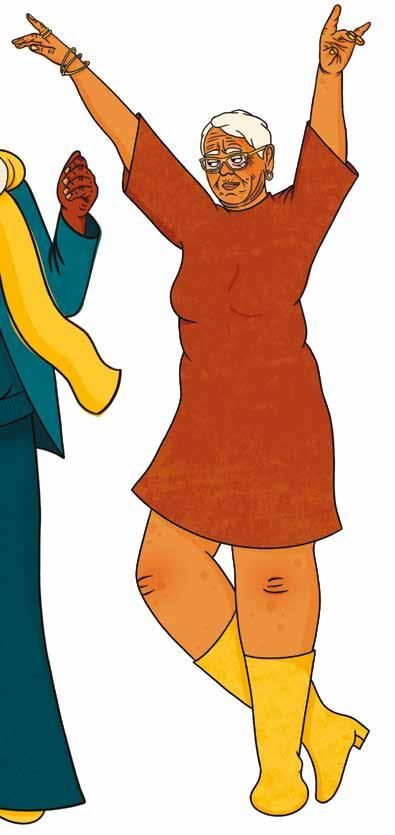
HEALTHY LIFESPAN INSTITUTE

Since its launch, the Charter has:
• created bespoke training for nurses at Primary Care Doncaster;

• been trialled as part of care homes’ quality assessment by Sheffield City Council;
• successfully informed the social cafes that support women’s wellbeing in the community (commissioned by Heeley Trust Sheffield);
• and become part of training for staff in residential and care homes, commissioned by Doncaster and Bassetlaw Teaching Hospitals and Project ECHO.
For more information, visit: agesexandrights.com
Watch the film about the charter on the UoS Player: player.sheffield.ac.uk/events/ over-hill-under-covers
The Institute’s latest initiative is studying ways in which poor communities in India can gain improved, climate-friendly access to nutrient-dense foods – with a view to giving Indian policymakers the evidence they need to inform changes.
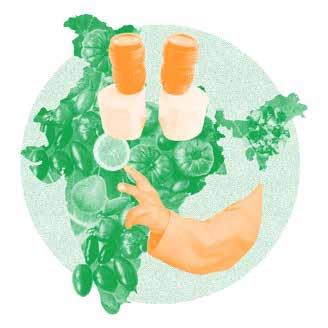
Researchers including Professor Bhavani Shankar and Dr Gregory Cooper will lead a research consortium in the new five-year INFUSION project: ‘Indian Food Systems for Improved Nutrition’. The research will develop and test ideas to leverage food markets in India, improving access to foods such as fruit, vegetables, milk, meat and eggs – taking on major challenges like the high perishability in tropical regions.
FOLLOWING THE CHAIN OF SUPPLY
Small local village markets are the main source of these foods for the rural poor. This project will study these markets, how consumers interact with them, and the chains from production to consumption. Working with a range of stakeholders, the initiative will then examine how government action can best support food markets to deliver these important foods to boost nutrition in climate-friendly ways.
For more information, visit: sheffield.ac.uk/sustainable-food/ news/major-new-project-studyways-improve-access-poornutritious-foods-india
YOUR UNIVERSITY 2023/24 THE MAGAZINE FOR ALUMNI AND FRIENDS 12
Improving access to nutritious foods in India
Small local village markets are the main source of these foods for the rural poor.
Illustration: DizzyLou
My Sheffield
Whilst representing her country at an elite level, Bryony Page also found the time to study for a degree in Biology.
Since graduating in 2015, she has become a multiple World and European Trampoline Champion, and fought her way back from physical and mental challenges to become the first British female in any gymnastic discipline to win medals at more than one Olympic games.

Bryony spoke to us on the eve of receiving an honorary degree from the University, reflecting on how her life and sporting career have been shaped by her time in the city.
How does it feel to be awarded an honorary degree?
It just fills me with pride. To have this connection to the city that will endure no matter where I go, and to be recognised for my contribution to a sport that’s been part of my life since I was nine, is very special.
What brought you to Sheffield, and how did it pair with your passion for trampolining?
I found a subject that would complement the logical side of my mind, and a city that felt like home. And of course the trampolining club, with a high-level coach in Paul Greaves. Receiving the Elite Sports Performance Scholarship made it possible for me to pursue my sporting career and still complete my degree. Finding people my own age, who shared my passion, also meant a lot to me – I made friends for life.
How did competing for the University compare with international competitions?
It doesn’t matter what the competition is, I always want to do well for my team. The only difference is the aftermath: the Uni team will be out celebrating no matter what the result.
We were all one team, and we would all support each other. I learned the importance of community at Sheffield and I took that with me to Team GB.
Early in your sporting career you suffered from ‘lost move syndrome’. How did you recover and how has it affected your career?
At one point I couldn’t even do a somersault. Eventually I became afraid of not taking off because I felt like a failure. The recovery process felt like a long one. I achieved skills then lost them again – repeating that process many times over and over. I would never, ever want to go through that again… but, there’s no denying… relearning everything as an adult has made me technically more sound. I feel stronger knowing that I don’t give up so easily.
You’ve been to two Olympic Games and won two medals. What’s your enduring memory of competing at that level?
First, getting to the final in Rio was making history. And then completing a routine to the best possible level at that moment is my favourite memory of my sporting career so far.
Things have only come together for me in that way twice in my 23 years in the sport. The fact that it happened at my first Olympics made it extra special. Receiving a medal was amazing, but it’s that feeling of getting everything as good as it could be that will stay with me.
You’re a pioneer in the sport, world champion and Olympian. So where do you go next?
I’m building up to the first qualifiers this summer ahead of the 2024 Olympics. My goal is to help the British trampoline team qualify the maximum of two quota places for women and also to focus on my own individual performance so I can be considered for the team. My long-term goal is to upgrade my personal best difficulty of 15.2 to a World Record breaking 16.4 routine, which is quite a jump. To give you an idea, I currently complete two triple somersaults and I’m working towards three triples. And after that? Well, I’ve always wanted to join Cirque du Soleil, so who knows, I might run off and join the circus!
Watch the full interview with Bryony at bit.ly/bryonypagesheffield
YOUR UNIVERSITY 2023/24 THE MAGAZINE FOR ALUMNI AND FRIENDS 14 15
“I learned the importance of community at Sheffield and I took that with me to Team GB.”
Image: Neil Shearer Photography
Made Together: A year in progress
When it launched, the Made Together programme cemented our commitment to make the region healthier, greener, more vibrant and innovative for all. Looking back at over a year of collaboration, we can see how projects and people are meeting the needs of South Yorkshire.
Regenerative Economy Attracting Investment Local Impact
n 2022, we launched the South Yorkshire Sustainability Centre with the South Yorkshire Mayoral Combined Authority, the four local authorities, Sheffield Hallam University, and a number of private and voluntary sector organisations.
The idea behind the Centre is to help the region reduce carbon emissions while creating new jobs and economic growth, not least by connecting our world-leading academics with businesses who need help to adapt.
They offer advice on how low-carbon technologies such as hydrogen, heat pumps and electrification should be deployed in SMEs.
Last year also saw the completion of the Sustainable Aviation Fuels Centre (see page 10) – the first UK centre of its kind – and a project with Doncaster Council on its successful Community Renewal Fund project to retrofit homes and make them more energy efficient.
Find out more by visiting sheffield.ac.uk/south-yorkssustainability-centre
he new Gene Therapy Innovation and Manufacturing Centre will advance scientific discoveries into promising treatment options for millions of patients with rare, life-threatening diseases.
The economic opportunities for the region could be considerable, given the Centre’s potential to catalyse new start-ups.
This will build on the impact of our Advanced Manufacturing Research Centre (AMRC), which has been driving innovation-led regeneration on the Sheffield-Rotherham border for more than 20 years. And an Economic Impact Analysis report by Lichfields in 2022 showed how the AMRC is a magnet for capital
investment, and for social mobility through apprenticeships. It’s been called one of the UKs ‘signature assets’, having brought more than £260m and 600 jobs to South Yorkshire.

And then there’s Northern Gritstone – the investment company founded by the universities of Sheffield, Leeds and Manchester, which allocated its first two investments to Sheffield-based businesses after announcing its first close of £215m in 2022. This is a significant milestone for the region, and shows the vital role the University can play in supporting innovation.
Find out more by visiting northern-gritstone.com
ogether with Sheffield Hallam University, we have secured joint funding for the next two years for Sheffield’s Children’s University (CU), with the vision of ensuring every child in South Yorkshire has access.

CU is a charity that works in partnership with schools to develop a love of learning in children, and young people who take part are much more likely to do better than they were expected to in their SATs and GCSEs.
The University also supported Barnsley Metropolitan Borough Council to secure £3 million from the Cultural Development Fund to transform areas of the town and we are working with Sheffield City Council on delivering its £15 million Future High Street Fund to transform Fargate and High Street.
And finally, across the city in 2022 our students dedicated 33,443 hours volunteering in food banks and community allotments, working with refugees, adults with learning disabilities, school children and the elderly. Through these amazing activities they have raised more than £85,000 for local charities.
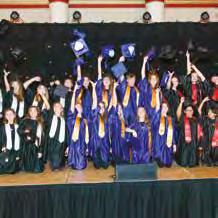
2023 sees the launch of the rebranded ‘Innovation Network South Yorkshire’, a collaborative network for academics and business delivered in partnership with Sheffield Hallam University, as well as further work on supporting the development of Harmony Works, a new cultural centre for young musicians in the city centre.
Discover more about the Made Together programme at sheffield.ac.uk/madetogether
I
T T
YOUR UNIVERSITY 2023/24 THE MAGAZINE FOR ALUMNI AND FRIENDS 16 17
Professor Richard Murphy, our own “radical accountant” and Professor of Accounting Practice at the Management School explains how we find ourselves in a crisis, and how by focusing less on political ideology and more on policy, the Government can begin to repair some of the damage.

Countering the cost of living: Solutions to the crisis
There’s almost universal agreement that the UK is facing one of its biggest economic crises for a long time. We really do face a situation of potentially epic proportions. But what is the crisis all about, what caused it and what (if anything) can be done to get us out of this mess?
SIGNS OF A CRISIS
The UK is in a mess. We know because we have high inflation and that has not happened for decades. As a result up to a quarter of UK households are thought to be facing problems caused by low pay rises and above-average inflation rate increases in the cost of essentials such as food, energy, transport, and mortgage and rent costs.
And we know we have a crisis because many public services in the UK are in meltdown. From the NHS to social care, schools, the justice system and even universities, continual Government cuts and a fall in inflation-adjusted pay (26% over a decade in the case of most doctors) has resulted in a haemorrhaging of talent, and a crisis in service delivery. All this is happening when overall tax rates as a percentage of GDP are at recent highs, and unemployment appears to be low.
Despite this, however, the FTSE 100 has hit an all-time high in 2023; UK banks are showing profits at the kind of high last seen before the 2008 global financial crisis; and energy companies are, perhaps unsurprisingly, doing even better. The economy is sending out paradoxical messages.
THE CAUSES ARE CLEAR
Although all economic crises are complex, this one has four fundamental causes:
• External shocks to the UK economy. Recovering from Covid and the war in Ukraine disrupted supply chains, creating inflationary pressure. But the Covid shock has already worked through the system. The financial impact of the war will also fade for us at least, as wholesale energy prices continue to fall. By mid 2024 the UK will have low inflation again. So, these external shocks are not the real cause of this crisis.
• Bank of England policy. The Bank has dramatically increased UK base interest rates to supposedly tackle inflation. However, as a matter of fact, inflation caused by external shocks that result in a cost-of-living crisis cannot be solved by increasing interest rates. This only works when there is excess demand in the economy, and we have the exact opposite. The Bank’s policy has sucked money from the economy – redirecting it from those on lower income
YOUR UNIVERSITY 2023/24 THE MAGAZINE FOR ALUMNI AND FRIENDS 18 19
Countering the cost of living: Solutions to the crisis (continued)
One network for all 300k alumni? Introducing Sheffield Connect
THE POLICY SOLUTION IS OBVIOUS
First: the Bank of England should reduce interest rates, rapidly. Combined with falling inflation, this will take a lot of pressure out of the cost-of-living crisis.
Second: the Government should give inflation-matching pay rises. They pay for themselves by ensuring people can keep on spending, which is what keeps the economy going around, and in turn ensures taxes are paid.
and with mortgages, to banks and those with savings. The result is increased inequality and a fall in real demand in the economy. This threatens jobs in the retail, leisure, and hospitality sectors in particular.
• Long-term austerity. Austerity has been in operation since 2010, and has been a disaster. The Government has more than decimated many services. However, this has not resulted in private sector growth as it was presumed, because the private sector is dependent on a functioning state sector to operate. We can now see this in the UK where it is thought part of our labour shortage is down to long waiting lists in the NHS with people being unable to work as a result.
• This Government has made the crisis worse. By trying to hold down public sector pay in the short term, and seeking as a result to hold down all pay rises. This is bizarre because if prices increase by for example 10% and wages increase by 10% to match, then profits would also increase by 10% and so tax revenues would rise as well –and so be available to pay 10% pay rises. But the moment you hold wages down you ensure income taxes are held down, which means the Government doesn’t have the means to give inflation-matching pay rises. This also reduces the cash available to spend by both people and the government, dragging down GDP. In short, holding pay down crushes the economy.
Third: austerity must go. The Government needs to spend more and borrow more. However, this should be done creatively, for example, by changing the £60 billion spent every year subsiding UK pension contributions and other savings of the wealthier in society – and using it to fund the infrastructure investment required to revive the UK economy, make it sustainable and so become the platform for future prosperity.
We can solve the UK economic crisis. What we cannot do is solve it with any of the same policies used by UK governments over the last decade.
What do you think about Richard’s analysis?
The University of Sheffield has a powerful, global network of over 300,000 graduates. For the first time we will be bringing this community together with the launch of our own online community and mentoring platform: Sheffield Connect. In Summer 2020, we reached out to the alumni community to find out how we can better support you. Nearly 6,000 of you helped by sharing views and ideas on how to improve our ‘lifetime members’ offer. We learned that you are proud to have studied here and that you love your connection to the University and the City. You want to stay close to us, and to each other. After two years of development, Sheffield Connect is ready to bring us all closer than ever.
YOUR ONLINE NETWORK

Sheffield Connect will be an exclusive online network for alumni and students, where you can build relationships with your peers, students can easily connect to alumni – and explore where their future careers could lie.
No matter where you are in the world, Sheffield Connect puts all the information you need in one place – making it easier than ever to experience the full benefits of being an alumnus.
TAILORED TO YOU
In our most recent survey you told us time is precious. You want to be certain that the time you dedicate to alumni activities is well spent. With Sheffield Connect, you’ll be able to customise what you see and who you hear from. That means content tailored to your specific interests and preferences.
PERSONAL MEETS PROFESSIONAL
This is your chance to explore new opportunities and make new connections with fellow alumni around the world. Sheffield Connect is a free networking tool that’s priceless for career development as well as catching up with old friends.

MENTORING AND SKILLS SHARE
In a challenging study environment and a difficult job market, mentoring can give us the edge.
Many of you are keen to share your experience with students and learn from other industry-leading alumni in your own disciplines. Sheffield Connect creates a safe space, matching alumni mentors with appropriate mentees. The platform will complement the activity in our successful programme for newly graduated alumni, The Boardroom.
EARLY ACCESS TO CONTENT AND EVENTS
You told us you’d like more events that align to your interests, your location and schedules. Sheffield Connect will be your go-to for more detailed information about a growing programme of events. So you can understand the benefits before committing your time.
Look out for more details on this landing in your inbox very soon.
The Sheffield Connect platform is in the final stages of development and will be launching in Autumn 2023. In the meantime, make sure your email address is up to date at sheffield.ac.uk/alumni/update so you don’t miss a thing.
YOUR UNIVERSITY 2023/24 THE MAGAZINE FOR ALUMNI AND FRIENDS 20 21
Join the conversation @SheffieldAlumni
There’s nowhere quite like Sheffield
When I visited Sheffield on the open day I knew it was the place I wanted to go. It was the mixture of new and old, urban and rural, far away (but not so far away), integration of students and local population, and change and opportunity. It was the heyday of the Socialist Republic of South Yorkshire. It had cheap bus fares on bendy buses, the ‘Hole in the Road’, Castle Market and the World Snooker Championships.
There’s something about Sheffield that wins people’s hearts, no matter where they come from. An ambitious modern city that’s walkable, affordable, and doesn’t swallow you up. Banging nightlife, a close-knit community of 60,000 students. Abundant greenery, more trees per person than any other European city, five rivers and a National Park. We might be biassed, but we think there’s nowhere quite like it.
The Welcome to Sheffield campaign is our way of sharing this wonderful ‘Sheffieldness’ with prospective students. Launched in partnership with the City Council and Hallam University, the campaign explores why Sheffield is one of the best places to live and study in the UK. You can see and share the campaign by visiting welcometosheffield.co.uk/ university-city
What you love most about your university city
The centrepiece of the campaign is a film exploring what people love best about Sheffield. That got us thinking about all the memories alumni have shared with us over the years. Looking back at these funny and touching anecdotes, we see that – though much has changed – the pure heart of the city remains the same.
While on a stroll around the Students’ Union during my third year, a friend of mine had the idea to spontaneously go to Rivelin before our last lecture of the day. As a nature lover, my breath was taken away – a beautiful tall waterfall in the clear freshwater surrounded by so many trees. I will never forget the first time I saw that place.
Marwa Ihsan (LLB Law with Criminology 2022)
Raymond Cansick (BA Accounting & Financial Management and Economics 1983)
“ When I visited Sheffield on the open day I knew it was the place I wanted to go.”


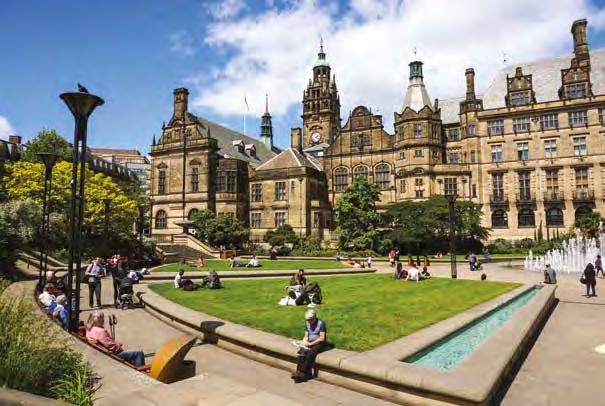
We returned to Sheffield in January 1984 to thick snow. One neighbour had a pair of climbing boots with him, and another had a pair of skis but no boots. However, the boots fitted on the skis, so we flattened down the snow on the lawns of Crewe Flats on Oakholme Road, then all had a go at skiing on our ‘piste’.
Alastair Inglis-Talyor (BA Latin 1986)
Me and my fellow nursing students went sledging when everything was closed (Broomhill area), I think it may have been the winter of 94/95. Snow so deep, we had to dig ourselves out of the house and my car was buried!
Clare Birschel (Bsc Nursing 1996)
Unlike some of the other University accommodation, Crewe Flats were experimental as there were no ‘grown-ups’ on site, only students who, among other things, ran the bar. This bar rapidly became legendary in that the licensing hours were only very loosely adhered to, often staying open until the early hours.
David Wilson (BEng Automatic and Control Systems Engineering 1975)
YOUR UNIVERSITY 2023/24 THE MAGAZINE FOR ALUMNI AND FRIENDS 22 23
“Unlike some of the other University accommodation, Crewe Flats were experimental.”
Like most student accommodation at the time, the flat was rather damp with only electric bar heaters for warmth. It had one tremendous advantage: a cellar. The room was a brilliant venue for parties and we made good use of it during the year. Some extension leads, baked spuds, a cassette player and plenty of beer – what more did you need?!
Sarah Caffyn (BA History 1982)
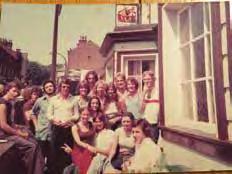
“ The room was a brilliant venue for parties and we made good use of it during the year.”

For Rag Week, we participated in the Annual Boat Race down the River Don. We made our own boats. Mine was a coracle from a lorry inner tube and a gunny sack – I won the novelty class. The end of the race was at the main sewer outfall into the Don and I had to work very hard to stop circling in the current of sewage. As we climbed out a battle-hardened nurse had us ‘drop ‘em’ and receive our tetanus shots!
Bryan Douglas Cook (BA Geography 1968)

I set off with a friend on Friday lunchtime and we hitch-hiked all the way to Paris and back over a weekend as part of RAG week. We had to stop off at official places like bus stations etc to get our card stamped to prove that we actually made it. The winner was the person who covered the most miles.
Jo Kearsley (née Mace) (BDS Clinical Dentistry 1987)
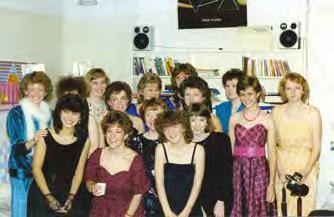

“I set off with a friend on Friday lunchtime and we hitch-hiked all the way to Paris.”
At the end of term, my housemate Paul had a party in his first floor room that literally brought the house down. There’d been a slow leak from his radiator, so the ceiling just relocated in one piece to cover up the dreadful 1970s carpet below! We’d all done our finals by then, and so we just picked our way round the rubble for the next couple of weeks.
Sara Cox (née Cowan) (BSc Zoology 1989)
The first Rag after the war, the VC decreed there should be ‘no indecent vulgarity’ and would inspect the entire procession before it set off. We decided to commemorate The Society for the Preservation of Old Sheffield Tools ... The sides of the lorry were decorated by planks with acceptable wording. After the lorry set off, the planks were rotated to reveal the hidden side. A prominent medical issue in 1945–46 was the prevalence of venereal disease, so the new sign read: ‘Do you suffer from tool trouble? Free & confidential advice here’. And the crew rapidly adopted suitable medical gear.

Mr Roger A Day (BMet Metallurgy 1947)
A group called The Beatles came to play at the City Hall in Sheffield and stayed next door. We went to see what was happening, and we walked straight through the crowd into the hotel reception. Sitting in the lobby area was Gerry Marsden, Roy Orbison, Ringo Starr, George Harrison and John Lennon! We were totally unfazed by them, and just sat down and had a long chat. We finally left when John Lennon wanted to come back to our digs for a party. We explained that we could be slung out of the rooms –but looking back, maybe it was a small risk to take!
Stuart Woolf (BDS Dentistry 1967)


I remember seeing the as yet relatively unknown David Bowie perform in the refectory. As the evening folded over and darkness came through from the tall glass wall, someone from our lights’ team targeted a spotlight on him. From the moment he sat down on a laminated chair in the middle of the stage, all the hubbub of people going to take showers, passing through the refectory to the Union building, ceased.
Dr Jurij Paraszczak
(BSc Chemistry 1973, PhD Chemistry 1977)
I have fond memories of nights in Corp with our dedicated ‘corp shoes’ getting covered in the sticky ‘corp juice’ that covered the floor. I hold Corp responsible for how I met my husband, and we’re still living in Sheffield all these years later.

Heather Clement (BA Modern Languages with Interpreting 2012)
READY TO MAKE MORE MEMORIES?
Join your fellow alumni for receptions, quizzes and other events throughout the year on campus in Sheffield, around the UK and internationally.
Climb on a bus and for 10p you could head over to the Students’ Union. Maybe go and see Kraftwerk or Blondie or The Boomtown Rats. NowSoc in the Union bar on Monday nights showcased local talent. To be in Sheffield in the ensuing years and stand in the audience to see Vice Versa (me included), The Human League, Cabaret Voltaire, Artery, ClockDVA, I’m So Hollow or countless other incredible local bands was something that influenced me for the rest of my life.
Dr Martin Fry (BA English Literature 1979, Hon DMus 2012). Lead singer of ABC.
Wednesdays were students’ nights at Shades club on Ecclesall Road, proud of its reputation as one of the country’s first multi-racial dance venues. Then there was the Penny Farthing on The Moor. Here you could mingle with ‘real’ people from the city and soak up your beer with portions of chicken in a basket. It was difficult to work out where the basket ended and the chicken began!
Richard Posner (BA Economics 1969)
To receive an invitation, simply make sure your contact details are up to date.
Complete the form at sheffield.ac.uk/alumni/ update

YOUR UNIVERSITY 2023/24 THE MAGAZINE FOR ALUMNI AND FRIENDS 24 25
Hello, it’s Sheffield calling
Celebrating 20 years of powerful conversations between students and alumni.
tudent callers have raised £1.5 million since 2003, simply by picking up the phone for a chat with alumni. Together, they’ve funded new facilities, scholarships, societies, and given students a lifeline during the pandemic. There’s no doubt about the impact this has had on the University down the years. But ‘calling’ has also changed the lives of the student callers themselves. We caught up with four of them to hear about their experiences, what they learned during their time on the phones and where they are now…
The first word has to go to David Meadows (BA Business Studies 2006), one of the original Student Callers, and now a senior fundraiser at the University. Throughout his degree, David worked in the alumni office –he even did his dissertation on the calling team!
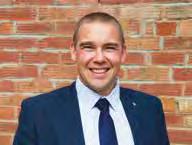
“I’ll never forget spotting that poster in the Students’ Union next to a payphone. ‘Get paid for talking to people?! I can do that.’ I never thought it would shape my life and career. I’m still here 20 years later.”
Though technically in the 21st century, the approach at first was old school: “Three or four of us, sitting around a boardroom table with a phone, and then just reams of paper, numbers, details and all the notes done by hand. Three hours is a long time to be talking and writing, so camaraderie was really important. We got each other through.”
Freddie Winter (BA Accounting and Financial Management, 2022) agrees: “It’s the atmosphere in the call room that sets the tone for the calls. When someone has a difficult conversation with an alum, you pick them back up,” he remembers.
“And the fundraising staff made it an incredible learning environment – they set us up to do our best on the calls. It’s about much more than money, it’s about building relationships.”
As we know, relationships take time, which is why student callers are never told how long or short a conversation should be.
Strengthening relationships
If any one word defines the history of student calling at Sheffield, it is ‘relationship’. Every student knows they’re reaching out to someone who was in their position 10, 20, 50 years ago. Someone with a lifelong connection to the University.
Rosslyn Owen (BA English Literature, 2011) explains:

“Rapport is a huge part of what calling is about. Money is important and it’s great if people want to donate, but our job was connecting to people and then
“I was on the line with one elderly gentleman for over two hours,” remembers Freddie. “He’d lost his wife a year or so before, and so I was one of the few people that he’d spoken to that week. Often, the calls that meandered in this way were the most rewarding, and the ones that stay with you.”
It’s something that resonates with David too, 20 years later.
“His name was Mr Kibble. We connected through a love of rugby and before I knew it, he was pledging £1,000, which was the most I’d ever received. But the best part is, years later when I began working in the fundraising team, I got to know Mr. Kibble even better – I took him to experience baked beans on toast in the Students’ Union and we went to a rugby match together.”
YOUR UNIVERSITY 2023/24 THE MAGAZINE FOR ALUMNI AND FRIENDS 26 27
S
“It’s about much more than money, it’s about building relationships.”
David Meadows BA Business Studies 2006
Rosslyn Owen BA English Literature, 2011 bringing them into a community they might not have known existed.”
Calling long distance
Students never make ‘cold calls’, because as alumni, there’s always an existing relationship with the person receiving the call. Some people are still surprised to hear from us, especially if they’re in a different time zone.
“Calling America was always fun,” reveals Rosslyn. “Generally there was this mixture of happiness and surprise. Some had only come for a semester, so it was only a small part of their lives but they were usually happy to give back. I guess Sheffield made a lasting impression.”
“What sticks with me is the contrast,” says Holly Wildish-Jones (BA Journalism 2015). “Chatting away to someone when it was daytime for them, and we’d just arrived in the call room at midnight wearing our pyjamas! We could get past that once we were chatting, especially because we could say exactly what the money would do, like paying for scholarships. That’s what resonated, even across the Atlantic.”
Real personal impact
Seeing the real impact of the money raised through student calling is what inspires alumni to give, and it’s what keeps our callers motivated too. John Makin (BA Accounting and Financial Management 1993, MBA Business Administration 1996), one of our alumni donors, explains why: “When I made the decision to come to Sheffield, tuition was essentially free. This provided an equality of opportunity, and I want others to have that same opportunity.”
Freddie also saw the personal impact, when making calls just after the wave of Covid-19 lockdowns. “The Student Hardship Fund was set up by the University because students’ main source of income – part-time jobs in hospitality – was hit hard. Lots of people, including people I lived with, didn’t have a safety net. So it was amazing to be able to do something about that, getting the word out to the alumni community and receiving donations I knew would go to people in the most need.”
Careers from calling
Beyond the community and the philanthropy, the camaraderie and the decent wage, there’s another serious benefit to being a Sheffield caller: career advice, on tap.
“I’d ask alumni what they thought I should do as a career,” admits David. “Having the opportunity to interact with hundreds of alumni, all from different generations, different courses, different backgrounds. It was priceless to have that kind of mentoring.”
David isn’t the only one whose working life has been shaped by their student job. From transferable skills to career choices, the influence of their time in the calling room is obvious.
“I’m on a graduate programme at EY,” says Freddie. “The ability to speak to someone I’ve never met and build a rapport from nothing is a skill I learned from calling, and I use it every day.”

And Rosslyn, too: “It’s become my career and I definitely credit my time as a student caller with making me aware that this world exists. I’ve worked across the UK as a fundraising consultant. And now I’ve come back to Sheffield, to work for Sheffield High School for Girls. I can see the benefits for students first hand, just like when I was calling.”
Take the call
“Just to learn that fundraising was a career was a real eye-opener. I was never going to be in a job that was process driven, or working off spreadsheets. I thrived on that relationship connection, and I’ve been enjoying a career in fundraising ever since.”
“I’m Senior Digital Campaigns Manager at the University of London,” says Holly. “Calling was a really valuable experience that set me up for a 7+ year career in the sector. Apart from my first job, the whole rest of my career I’ve worked at universities, including at the University of Sheffield.”
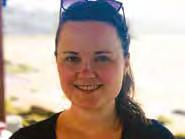
Of course, as much as we have the callers to thank for the last 20 years, it takes two to make a connection. Every call answered by you, our alumni, makes a difference. John puts it best: “Take the call. Take the opportunity to discuss and understand why the students on the other end of the line are asking for your assistance. Support the next generation as best you can.”
So with that in mind, we’ll give the last word to David, too: “I can guarantee at the very least you’ll have an authentic conversation with someone ready to soak up your experience, and even make a lasting connection. Who wouldn’t want to take that call?”
Are you ready to speak to a student caller?
Let us know with a quick email to giving@sheffield.ac.uk And if you’ve already given us permission to get in touch, please make sure your contact details are up to date here: sheffield.ac.uk/alumni/update
YOUR UNIVERSITY 2023/24 THE MAGAZINE FOR ALUMNI AND FRIENDS 28 29
“Imagine you have the opportunity to interact with hundreds of alumni, all from different generations. It was priceless.”
“ The ability to speak to someone and build a rapport from nothing is a skill I use every day.”
“It’s become my career and I definitely credit my time as a student caller with making me aware that this world exists.”
Freddie Winter BA Accounting and Financial Management, 2022
Holly Wildish-Jones BA Journalism 2015
Gentleman, tie collector and music fanatic, John knew how to enjoy the simple things in life. And with his sharp mind and kind heart, he was a dear friend and inspiring teacher – not to mention a formidable quiz opponent. We take a look back at John’s life, and what his generous gift to the University will mean for students today, and in the years to come.
The lasting legacy of alumnus John Turner
BSc Mathematics 1968 2nd October 1946 to 20th December 2019
John graduated with a degree in mathematics from the University of Sheffield in 1968 and dedicated the rest of his life to learning and to teaching.

Lecturing first at Letchworth after graduation, John returned to Staffordshire where he joined the brand new Sixth Form College in 1970.
As a lecturer at Stoke – the first purpose-built college of its kind in the country – John was well respected by his students and fellow staff. It was in these early years at the college where John was to make friends that would be with him for the rest of his life.
Colleagues loved the humour John brought to lectures, his great patience, kindness and willingness to support everyone who worked and studied with him. He is remembered for his genuine desire to help his students achieve their goals.
It is fitting then that someone with such a love of learning, and of life, should leave such a legacy with his alma mater in the form of a £100,000 unrestricted residual gift.
‘Unrestricted’ means the University can allocate the funds where the need is greatest, to make sure John’s contribution goes on to help as many people as possible.
Here are just a few ways in which John’s gift is making a difference:
Inspiring children into STEM
Thanks to John’s contribution, the next generation are being inspired to study science, engineering, and his beloved mathematics. The Maker{Futures} programme blends STEM subjects with the arts to fire the imagination of school children. Through pop-up events, resources and workshops for schools, community clubs and museum collabs, thousands of children have already connected with subjects that might otherwise have felt inaccessible to them.
Funding student clubs and societies
John’s legacy is making a difference to students on campus too. From expanding opportunities in the rowing squad with new ‘Cox Box’ technology; funding a new drone to allow engineering students to compete internationally; expanding participation in the canoe club by updating its ageing fleet of training kayaks; and helping us host the University Brass Band Championships of Great Britain and Northern Ireland.
No matter the size of the donation, leaving a gift to the University in your Will is an extraordinary way to support students and to celebrate your life.
If you’d like to talk about your own legacy, our Philanthropy Manager David Meadows can help.
T: +44 (0) 114 222 1073
E: d.meadows@sheffield.ac.uk
W: sheffield.ac.uk/giving/legacies
Supporting students to achieve
their
potential
A significant part of John’s gift is now funding our scholarships for students most in need. These offer a lifeline to those who have earned their place at university, but need financial assistance to complete their studies and make the most of their time here.
Valentia Adarkwa-Afari (BA English & History 2021, MA English Literature 2022) is just one of the many students who have received a scholarship funded by John’s legacy gift. In a note to express her thanks, Valentia said:
“This scholarship meant that I could study a subject I have been enthralled with since I was a child. I can concentrate on my degree without having to balance a parttime job. What makes Sheffield so special is the genuine love people have for the university and the city. This love is so strong that it continues long after people have graduated and go on to do great things. I am so grateful that your love for Sheffield has expanded to all its subsequent students and you have opened opportunities for people who need extra support. From one person who loves Sheffield to another, thank you!”
YOUR UNIVERSITY 2023/24 THE MAGAZINE FOR ALUMNI AND FRIENDS 30 31
HOW DO YOU WANT TO BE REMEMBERED?
In profile
TIM - I came to Sheffield University twice; the first time in 1989. But I wasn’t ready for it. I left and took a couple of years off – mostly exploring film and architecture while living in Edinburgh. I’d fallen in love with English and photography, so when I came back in 1991, I found myself exploring both of those subjects. Sheffield was very much the ‘crucible’ of the creative me. It was a kind of awakening.
Timothy Durant
BA English Literature 1994
Award-winning designer and producer of live experiences, including Olympic opening ceremonies, halftime shows and music tours. Tim has worked with the NFL, Neil Diamond, Paul McCartney and Bruno Mars, to name a few.

Paul Kewley
BSc Natural Environmental Science 1993
Award-winning film and TV producer, Oscar, BAFTA and Golden Globe-nominee. Paul has worked with Aardman Animations, Illumination and Netflix – winning an Emmy for Shaun the Sheep: The Farmer’s Llamas.
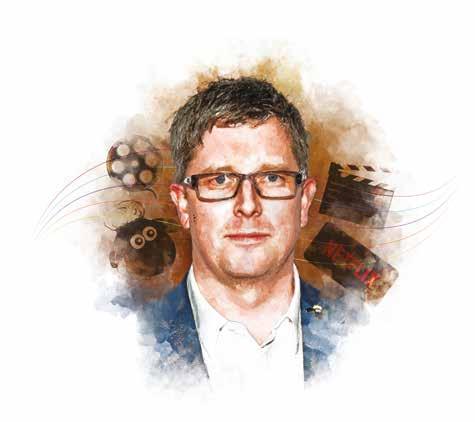
PAUL - Yes, it was the same for me. I’d produced live TV before uni, so when I learned Sheffield had nothing extra-curricular for TV or radio, myself and a guy called Dave ‘Spoon Chicken’ Simpson naively decided to start the Radio and TV Society. By the end of the Freshers Fair, ours was the second biggest society in the Union. And Tim was one of the first people who signed up. It was Dr Patrick Courtney, AKA Pik, who suggested a radio station and encouraged us to get a thing called a restricted service licence: try it, see how it goes, use that as a kind of bridge into other things. And Mr. Durant came up with the name ‘Forge’.
TIM - …though I never got any royalties, it definitely was a bridge. It got me my first trip to the U.S. They kindly sent me over to the College Music Journal Festival in Providence, Rhode Island. And I remember thinking ‘you know what, I should probably move here.’ It opened up a whole world for me that I hadn’t considered. So later, after I’d graduated, and studied for an MA in Film and TV at the British Film Institute, I turned my sights back to America. Of course, Paul was already there.
PAUL - The Peter Stark Program at the USC School of Cinematic Arts was my first taste of America. I’d applied for a Fulbright Scholarship and – with a bit of help from BUNAC and Yorkshire Television – found myself in Southern California. It was a total gamble. I was just following my heart. Tim followed me two years after that, also as a Fulbright Scholar, and we became housemates for a year. It took a long time to get to a point where I could actually say I was a film producer. I’d sell scripts, set them up with studios, develop them, and then some terrible tragedy would befall the project, just as I thought it was about to happen. That’s basically the way the film world works. Though I learned a lot, and had some success on the way, too. Then in 2009 Aardman Animations offered me a job as a Development Producer (I had no idea what that meant and I don’t think they did either). I produced the Shaun the Sheep movies, among other projects. And until recently I’ve been working for Illumination… So, if you’d asked me when I was at Sheffield, what am I gonna (continued...)
THE MAGAZINE FOR ALUMNI AND FRIENDS 33 YOUR UNIVERSITY 2023/24 32
“Sheffield was very much the ‘crucible of the creative me. It was a kind of awakening.”
TIMOTHY DURANT
do when I grow up? I probably wouldn’t have said producer and I definitely wouldn’t have said animation. But that’s the great thing about university. It opens you up to so many different possibilities…
TIM - Yes, it’s really just about learning some skills and exploring your interests, and learning who you are. English taught me how to think, how to read a text. Working at the radio station and with the film unit, I learned about promotion and graphic design. After I graduated I worked for Propaganda Films – a leading music video and commercials company – doing a lot of motion graphics for them. Then one day I ended up doing that on a music tour, and found my niche. Ever since then, I’ve been working in live events.
PAUL - If I was rigid, I’d have been looking for a job that was some rare combination of earth science and film. But at USC, we had classes from the Line Producer on Jurassic Park, and I realised that someone already had that job! When I’m in between projects, I’ll often have to sit down and remind myself that it’s ok to just go with it, and not be too fixated on what’s next.
That’s the most important life lesson I learned at the University of Sheffield: just work hard, and go with it.
TIM - It’s all about finding out who you are, and seeing where that takes you. Yeah, there’ll be this disappointment here, that frustration there. But you just have to keep your eye on what you love. It hasn’t been a straight road for me, but I can honestly say I wouldn’t be where I am if it wasn’t for my time at Sheffield.
BA Sociology 2004
Founder and Director at Zebedee, global talent management agency for disabled, visibly different & trans/non binary models & actors; Keynote Speaker, BFC Changemakers Award Finalist; Honorary Fellow, Condé Nast College of Fashion and Design.
Laura always had a passion for helping people, and a deep interest in the social sciences. This combination of head and heart has guided her extraordinary and varied career over the last 20 years – from the University of Sheffield to founding the UK’s first truly inclusive talent agency.
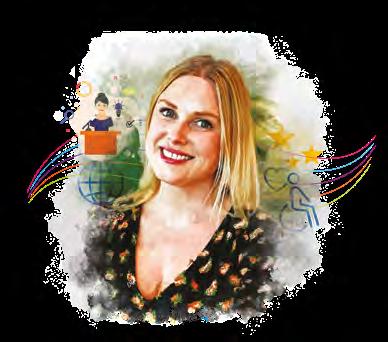
“Walking the city after the open day, I remember feeling that the place felt like home. And it’s still home 20 years later. What I took from my time at Sheffield was how to think deeply about something, to explore a subject from all angles – something that’s definitely stood me in good stead. When I graduated, I considered pursuing a social work qualification… but I felt I’d done enough study, and it was time to enter ‘the real world’. So, I applied for a graduate management course, and spent three years in business and then later moved into recruitment.
With the benefit of hindsight, I can see I wanted to work with people and this was the first step into that. I enjoyed recruitment but ultimately it was obviously profitfocused – so I spent a lot of time volunteering with young offenders and at local youth centres. It was then I decided to study for my masters and moved into social work full time.
I worked in the leaving care team, and then in the early intervention team. I loved it and I certainly wasn’t looking to change my career again! Then in 2017, I was on maternity leave with my first child, on a beach walk with my sister-in-law, Zoe. She taught young people with disabilities, and we were chatting about the lack of opportunities for disabled people in fashion and advertising. How was it that such a large section of society is excluded from the media? We looked at each other and both said: “Should we set up an agency?” A quick bit of Google research later and we were on the phone to Companies House. Then scouting for jobs, models and setting up a website a few days after. It really was that quick. Finding models was the easy part. Zoe’s performing arts pupils were our first models. We also knew there were thousands of talented, different people just waiting for the industry to give them the opportunity.
After around a year of literally phoning round, making connections, a magazine for people with disabilities ran a piece on us, and we appeared on This Morning shortly after. The floodgates opened and I decided to run Zebedee full time.
The real challenge for us has been educating the whole industry. Not only did we have to get our foot in the door, we had to change minds along the way. Everyone was talking about ‘inclusion and diversity’, but their definition didn’t involve models or actors with disabilities. Today, we have offices in Europe, America, Australia and Japan. Things are changing slowly and I’m proud we’ve played our part in making that happen.
YOUR UNIVERSITY 2023/24 THE MAGAZINE FOR ALUMNI AND FRIENDS 34 35
“When I’m in between projects, I’ll often have to sit down and remind myself that it’s ok to just go with it and not to be too fixated on what’s next.”
“When I graduated, I considered pursuing a social work qualification... but I felt I’d done enough study, and it was time to enter ‘the real world’.”
Laura Winson
PGDip High intensity
Psychological Interventions
2022
Cognitive Behavioural Psychotherapist; Young Innovators

Award Winner 22/23; Founder and Director of Fabulously Thriving, an organisation providing mental health support and community to women living with Complex PTSD.
From NHS mental health nurse to psychotherapist to agent for social change – Ellie’s life and career have been anything but ordinary. Today, over two years after her own diagnosis, Ellie is building on her personal and professional experience to change the lives of women looking to heal from the effects of Complex PTSD and childhood trauma.
“I wouldn’t say I consciously chose to work in mental health because of my own personal history. I’ve used mental health services since I was a child, though I kept that part of my life private while studying at college and university. I wanted to help people, and I found the subject interesting. Maybe I just didn’t want it to define me.
“I’ve got massive plans, the kind of plans you make when you’re naive about business. I think that’s a good thing, and with the mentoring and funding from the Young Innovators Award, I’m ready to start helping people heal.”
As a nurse I often worked in GP surgeries alongside Cognitive Behavioural Therapy (CBT) practitioners. I was helping people, but felt I was only scratching the surface. I wanted to see that profound change which can only come with therapy. So, I decided to qualify as a CBT psychotherapist myself.
Sheffield is one of the top UK universities for this CBT qualification, and I was made up to secure a place. Looking back now, that year was incredibly hard. Covid was at its peak, and my week was divided between two extremes: two days online study, three days in a healthcare setting. But my tutors and the other students on the course made it an amazing experience. Practising therapy techniques on each other definitely brings you closer to someone so although we weren’t meeting in person, it was still a strong support network.
Around this time, I was diagnosed with Complex PTSD as a result of childhood trauma. It’s not a very well-known condition. It involves a lot of symptoms of PTSD, anxiety and depression, and because it begins in childhood it affects how your brain and body develops.
It can negatively impact almost every area of your life –relationships, feeling happy, and holding down a job.
I knew this all too well: I’d spent years trying to work a full time job, and here I was again, newly qualified and newly diagnosed, trying to help people as a therapist five days a week. I needed more control over my working week. And I knew the people I was working with needed something more than the 20 sessions available on the NHS.
That’s when Fabulously Thriving was born. The name comes from my time at Sheffield. My tutor used to ask me how I was doing, and every day I would reply “surviving, not thriving.” But everyone with Complex PTSD deserves to do better than just ‘survive’. And the way to do that is to normalise talking about the condition. My plan is to provide accessible, affordable support for anyone who needs it – to challenge the stigma, and the isolation, by creating a big community of women.
Master of Public HealthEuroPubHealth + Program
2019
Advisor to the Prime Minister of The Bahamas; Climate change and public health policy specialist; Small island policy and health researcher.

Charles knows how to make real change happen for himself and for those around him. And he works fast – growing from his workingclass roots to a policy specialist and now climate change advisor to the PM of The Bahamas, and all by the age of 33. His career is one built on hard work, passion and most of all being open to possibilities.
“To be in this position at my age… I consider it an honour. I’m humbled by it. Things have just divinely aligned at the right time –the priorities of the administration, my experience and my passion. That’s how I got here I think. It started because I found something I was passionate about.
“To be in this position at my age...I consider it an honour. I’m humbled by it. Things have just divinely aligned at the right time – the priorities of the administration, my experience and my passion.”
I don’t come from a place of privilege. I’m black and from a low income family. It’s taken me multiple scholarships, loans, and then two GoFundMes to finish my masters. Powered by the support of my friends, my family and even strangers. If anyone had said to me when I graduated that this is where I’d be in four years… I would have laughed.
And this is definitely where I want to be, though not necessarily what I aimed for. I always intended to return to education after completing my undergraduate degree, and a fellow Bahamian recommended EuroPubHealth+ programme. I knew people who’d attended the University of Sheffield. They raved about ScHARR, and its applied research had a great reputation. The values of the uni also resonated – how multicultural it is – and of course the tonne of nature that surrounds Sheffield!
I have so many memories of living on Rockingham Lane, and the 30plus people in the programme who became like a close-knit family.
In fact, I met someone who was to become my best friend when I began organising the first Sheffield World Health Organisation simulation – SheffWHO. My time at Sheffield was hugely formative for me. The personal and the academic support I received to go beyond my limits is definitely a big part of why I am where I am, today.
From returning to education, to organising SheffWHO and beyond, every move I’ve made has been a leap of faith – but I’ve tried to be open to possibilities. You miss 100% of the shots you don’t take, right? I think if you’re coming out of uni now it’s easy to look at the job market and think ‘I need to jump into something or I won’t be successful.’ My advice is to pause and reflect on your strengths. I recommend working with your own hands, letting your talents make room for you. Sometimes you want a seat at the table, and sometimes you have to build your own table and bring people to it. We need more people to build their own table.”
YOUR UNIVERSITY 2023/24 THE MAGAZINE FOR ALUMNI AND FRIENDS 36 37
Dates for your diary
What’s coming up
Every year you, our alumni, keep the University community alive by connecting with each other and with the next generation. Read on to find out what’s happening on campus and beyond in the next twelve months.
Volunteering opportunities
Every year, alumni volunteers give their time to support students across the University. If you’ve got a little spare time and valuable experience to share, why not volunteer at this year’s online and in-person events?
CITY CONNECTIONS: ARTS AND HUMANITIES AND SOCIAL SCIENCES
City Connections supports students from under-represented backgrounds to develop their skills on a day-long visit to alumni businesses:
HERITAGE CIRCLE LUNCH
Where: Firth Hall, Sheffield | When: 3rd November 2023
Interested in leaving a gift in your Will to the University? Have you already made this generous pledge? Come along to this event to see the difference you could make. Contact d.meadows@sheffield.ac.uk or call 0114 222 1073.
COACH CAFE
Where: online | When: year-round events
Coach Cafe is a programme of online networking events for alumni and students. If you have early career experience and personal insights from your sector to share, sign up here: sheffield.ac.uk/alumni/coach-cafe

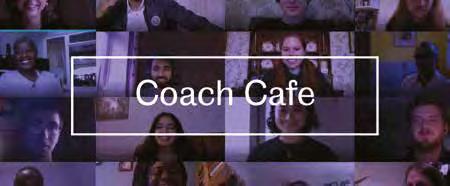
ANNIVERSARY REUNION
LUNCH: CLASSES OF 1959, 1964 AND 1974
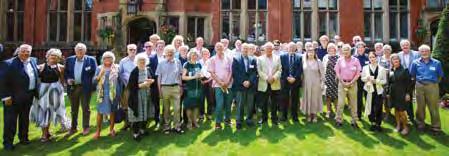
Where: Firth Hall, Sheffield
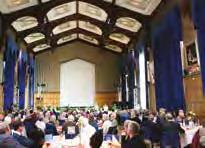
When: 2024 (details tbc)
You’ll receive an invitation to this special event by email in early 2024. Check we’ve got the correct email address to be sure you receive your invite. Visit: sheffield.ac.uk/alumni/update
BRIGHT MINDS
Where: online | When: year-round events
Now in its third year, Bright Minds gives PhD students the opportunity to present their cutting-edge research to you, our global alumni audience, in a virtual TED Talk style event – available on the UoS Player. Put your questions to upcoming speakers and see all previous webinars: sheffield.ac.uk/alumni/bright-minds

GLOBAL ENGINEERING CHALLENGE / ENGINEERING YOU’RE HIRED
Where: On campus
When: January and February 2024
Calling engineering graduates!
Take part in our flagship project weeks and support the engineers of tomorrow.
- NORTHERN CITY CONNECTIONS
When: November 2023
Inspire students and share your experiences of living and working in Sheffield or the wider North. Sign up today and enhance someone’s career prospects.
- LONDON CITY CONNECTIONS
When: March 2024
Are you a Social Sciences or Arts and Humanities graduate now based down in London?
We need you to network with current students and give them advice on building a career in the capital, as well as help them to see the opportunities available to them as Sheffield graduates.
Find out more at: sheffield.ac.uk/alumni/ volunteer/opportunities
YOUR UNIVERSITY 2023/24 THE MAGAZINE FOR ALUMNI AND FRIENDS 38 39
27 JULY SEPTEMBERNOVEMBER 2318
JULY SEPTEMBERNOVEMBER
JULY SEPTEMBERNOVEMBER
27
2318 27
2318
Your notes and news
Recognising the recent successes and achievements of the alumni community.
2020s
Ellie Morris (PG DIP High Intensity Psychological Interventions 2022) has been awarded the prestigious Young Innovators Award 2022/23 for her business Fabulously Thriving (see In Profile, page 36).
Dr Andrei Braitor (PhD Automatic Control and Systems Engineering 2021) has been awarded the prestigious Control & Automation Doctoral Dissertation Prize 2022 by the Institution of Engineering and Technology (IET).
Chloe Tolley (BSc Medical Genetics 2022) has been awarded the inaugural Julia Garnham Prize in Clinical Genetics in recognition of their performance on an NHS work placement.
Georgina Quach (MA Journalism 2021) has been awarded the Trainee Features award by the National Council for the Training of Journalists (NCTJ).
Mikolaj Chmiel (BA Architecture 2022) was highly commended at the Global Undergraduate Awards 2022 and awarded the Regional Award in Architecture and Design for Europe.
Gopesh Yadav Dosieah (MEng Mechatronic and Robotic Engineering 2020) has been awarded for best research paper at the 2022 International Conference on Swarm Intelligence.
2010s
Kate Wareham (MA Music Psychology in Education 2017) has been appointed CEO of The Choir With No Name, a charity committed to building joyful communities with homeless and marginalised people through music.
Laurence Collingwood (BA Mechanical Engineering 2019) has been awarded the prestigious Young Innovators Award 2022/23 for Cilo, a carbon footprint tracking app.

Muyiwa Oki (BA Architecture 2013, MArch Architecture 2016) has been elected as President of the Royal Institute of British Architects (RIBA).
Ella Taylor (BMus Music 2016) has been chosen to sing Tebaldo in Don Carlo making her debut with the Royal Opera in London.
Reham Fakieh (MSc Economics of Money 2011) has been awarded the Social Action Award in the Study UK Alumni Awards in Saudi Arabia.

Pulasta Dhar (MA Broadcast Journalism 2011) is the first Indian to commentate on the India Super League Football Final for the English World Feed.
Munya Chawawa (BSc Psychology 2014) was nominated for a BAFTA award in the category of Specialist Factual for his TV programme How to Survive a Dictator with Munya Chawawa.

Simeon Shtebunaev (BA Architecture 2013, MArch Architecture and Town Planning 2017) has been awarded Young Planner of the Year at the Royal Town Planning Institute Awards for Planning Excellence in 2022.
Farhana Jiwa (MArch Architecture and Town Planning 2019) and Charlie Palmer (MArch Architecture 2015) were selected by RIBA as 2022 Rising Stars.
Alice Watson-Flowers (BSc Geography 2019) has led an investigation as Trainee Detective Constable for South Yorkshire Police that involved a violent robbery against an elderly woman and has culminated with a six-year prison sentence.
Joe Woodley (BSc Biomedical Science 2017, MSc Stem Cell and Regenerative Medicine 2018), Ralph Street (BA Geography and Town Planning 2012) and Chris Smithard (BEng Civil Engineering 2011) have been selected to compete in Norway for the first round at the Orienteering World Cup.
Professor Jaime Delgadillo (PG Cert Learning and Teaching 2019) has been awarded the Outstanding Early Career Achievement 2022 by the Society for Psychotherapy Research (SPR).
Dr Kirsty Smitten (MChem Chemistry 2016, PhD Chemistry and Microbiology 2022) has been awarded the Young Entrepreneur of the Year by the Federation of Small Businesses (FSB) in Yorkshire and the Humber for her company MetalloBio Ltd.
Mary Hewitt (BSc Computer Science 2021) and Guanyu Huang (MA Teaching Chinese as a Foreign Language 2011) have been awarded Best Design at the Human-Robot Interaction (HRI) 2023 Student Design Competition for their project Melodica: An Affordable Music Companion during their PhD studies.
2000s
Hassan Al-Thawadi (LLB Law 2001) was appointed Secretary General of the 2022 FIFA World Cup’s organising committee.
Lucy Prebble (BA English Literature 2002) has been awarded the Writer - Drama award from the Royal Television Society for her script I Hate Suzie Too!

Victoria Cox (BSc Mathematics with Study in Europe 2009) has been awarded an individual commendation in The Vice Chief of the Defence Staff (VCDS) Commendation Awards.
Lisa Bradley (MA Journalism 2002) has been highly commended in the Innovation of the Year award by the NCTJ for her teaching on resilience and trauma training at the University of Sheffield.
1990s
Mark Sidaway (BA Politics 1994) was appointed Executive Producer and Showrunner for the Platinum Party at the Palace to commemorate the Platinum Jubilee of HRH Elizabeth II.
Satwinder Samra (BA Architectural Studies 1991, MA Architecture 1994) has been appointed the host for RIBA Building Stories, a live event that celebrates the Stephen Lawrence Prize 2022 winner.
Peter Skipworth (BA Civil and Structural Engineering 1992) has been appointed CEO of Cura Terrae, a leading UK environmental group.
Ellie Gibson (BA English Literature 1999) has broken the world record for playing PowerWash simulator for over 24 hours straight as part of her fundraising campaign for Borne, a non-profit organisation.
1980s
Lindsey Richards (BA Urban Studies 1984) has been appointed Vice President for the Royal Town Planning Institute.
Ade Solanke (BA English Literature 1984) has been featured on BBC Radio 3 for her research on Phyllis Wheatley.

Andy Haldane (BA Accounting and Financial Management and Economics 1988, Hon LittD 2018), has been appointed Chair of the industrial board at the University’s Advanced Manufacturing Research Centre.
1970s
Iain Ferguson (BSC Combined Studies: Geology and Botany 1978) has been awarded the Frank Paine Packaging prize by the Institute of Materials, Minerals and Mining for his exceptional global contribution to the packaging community.
Arthur Timothy (BA Architecture 1979) has opened his exhibition Postcards from a Promised Land at Gallery 1957 in London.
Colin Ross (BSc Hons Geology
1974, PGCE Education 1975) and Susan Ross (BSc Geology 1976, PGCE Education 1977, MEd Education 1992) have been appointed Lord and Lady Mayor of Sheffield.
Dr Sabine Little (PGCE Education 1999, MEd Networked Collaborative Learning 2002, MA Educational Research 2003, PG CERT Education 2005 and PhD Education 2006) has been invited to join the Advisory Council of the Heritage Language Education Network in the Netherlands.
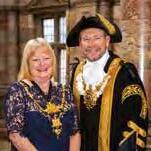
YOUR UNIVERSITY 2023/24 THE MAGAZINE FOR ALUMNI AND FRIENDS 40 41
Honorary degrees Alumni honours
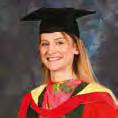
Honorary degrees are awarded to those who have given distinguished service or brought distinction to the University, the city of Sheffield or the region. This year’s alumni recipients are detailed below.
January 2023
Bryony Page (BSc Biology 2015, Hon LittD 2023) is the first British trampolinist to win an Olympic medal and a recipient of the Chancellor’s Medal.
Professor Sir Stewart Cole KCMG (PhD Molecular Genetics 1979, Hon MD 2023) is an internationally acclaimed scientist, who received a knighthood in the New Year Honours 2022 and is the current President of the Institut Pasteur.
July 2023
Dr Olanike Folayan MBE, PhD, CEng., FIET (PhD Electronics 2007, Hon DEng 2023) Co-founder and chairperson of AFBE-UK and advocate for equality, inclusion and diversity in engineering.

Dr Kris Gibbon-Walsh FRSA (MChem Chemistry 2006, Hon LittD 2023) UK Director of Network, Community and Operations of FareShare UK.
Alison Hope (BSc Chemistry 1978, Hon LittD 2023) the former ProChancellor of University Council.
Richard Mayson (BA Geography 1983, Hon LittD 2023) Former ProChancellor of University Council, award-winning British author, writer and editor specialising in fortified and Portuguese wines.
Hollie Pearne-Webb MBE (BA Economics 2013, Hon LittD 2023) Olympic medal winner and captain of the Great Britain Hockey Team.
Alumni volunteer of the Year – 2023
Here are some of your fellow alumni who were recognised for their outstanding contributions to society in the New Year Honours 2023.
Professor Cathryn E. Nutbrown (PhD Education 1997) was made an OBE for services to early childhood education.
Peter J. McGhee (BSc Maths 1986, Postgraduate Certificate in Education 1987) was made a CBE for services to further education.
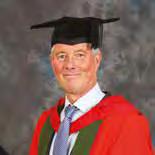
Ewen M. Harrison (Statistics 2012, MSc Stats with Med App DL 2015) was made an MBE for services to the Covid-19 response.
Oluwole O. Folayan (BEng Chemical Process Engineering and Fuel Technology 1999) was made an MBE for services to equality, diversity and inclusion in engineering.
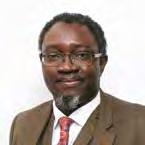
Dominic Jacquesson (MSc Occupational Psychology 1994) was made an MBE for services to technology and entrepreneurship.
Dr Shaid Mahmood (PhD Chemistry 1993) was made an MBE for services to further education in Leeds.
Charles J. Ritchie (Applied Maths and Computer Science 1975, MA World Music Studies DL 2011) was made an MBE for services to charity and to the families bereaved by gambling related suicides.
June D. Sanders (BA English 1966) was made an MBE for services to charity and mental health.

Professor Helen M. Sweetland (MB ChB Medicine 1983, MD Medicine 1992) was made an MBE for services to patient care and medical education.
Helena Whitbread (Hon LittD 2023) was made an MBE for services to history and to literature.
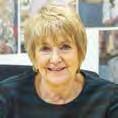
Mark B. Glossop (BEng Mining 1959) was awarded an OBE for services to the community in Worcester.
Francesca Atkinson (MEng Bioengineering 2017)

Frankie studied Bioengineering and graduated in 2017. She was nominated for the award after giving her time to speak to University of Sheffield students over the past four years and sharing her personal experience. Students have told us they really value the time and effort that Frankie puts into talking to them about their career options – describing her as an “inspiration.” We think she is an excellent example of a Sheffield graduate, and definitely worthy of this year’s award.
Frankie reveals why she chooses to dedicate her time: “Having the chance to share my life experience with University of Sheffield students is so rewarding – it always leads to great discussion within the group. I hope that through these open conversations, students have gained some useful insights into the different options available to them. And that they go away from our chats feeling empowered to direct their own future, and seize every opportunity.”
YOUR UNIVERSITY 2023/24 42
THE MAGAZINE FOR ALUMNI
FRIENDS 43
AND
“Having the chance to share my life experience with University of Sheffield students is so rewarding –it always leads to great discussion within the group.”
Keep
Postgraduate study discount sheffield.ac.uk/postgraduate/alumni-rewards
Online taster courses
sheffield.ac.uk/online-learning/futurelearn
Free careers advice
sheffield.ac.uk/careers/graduate
Job opportunities careerconnect.sheffield.ac.uk
Library access – online and in-person sheffield.ac.uk/library/visitors/alumni Connect
Enjoy
Discounted concert tickets
performancevenues.group.shef.ac.uk/concerts
Discounted membership at Goodwin Sports Centre sport-sheffield.com/memberships/alumni
Hotels, dining and marriage venues sheffield.ac.uk/alumni/benefits
Become
sheffieldstore.com/collections/stationery/products/ sheffield-students-union-life-membership
Your local alumni group,
Exclusive events, online and in-person sheffield.ac.uk/alumni/events
Volunteering to inspire the next generation sheffield.ac.uk/alumni/volunteer
member
You’re a lifetime
learning and growing with:
with your community, through:
in
wherever you are
the world sheffield.ac.uk/alumni/international
Sheffield anytime you like, with:
a lifetime member of the Students’ Union:
the most of your alumni benefits Need help? Just pick up the phone and call us +44 (0)114 2221071 or visit sheffield.ac.uk/alumni/benefits Coming Soon Sheffield Connect
page 21
more
Make
See
for




















 ENERGY INSTITUTE
ENERGY INSTITUTE



















































